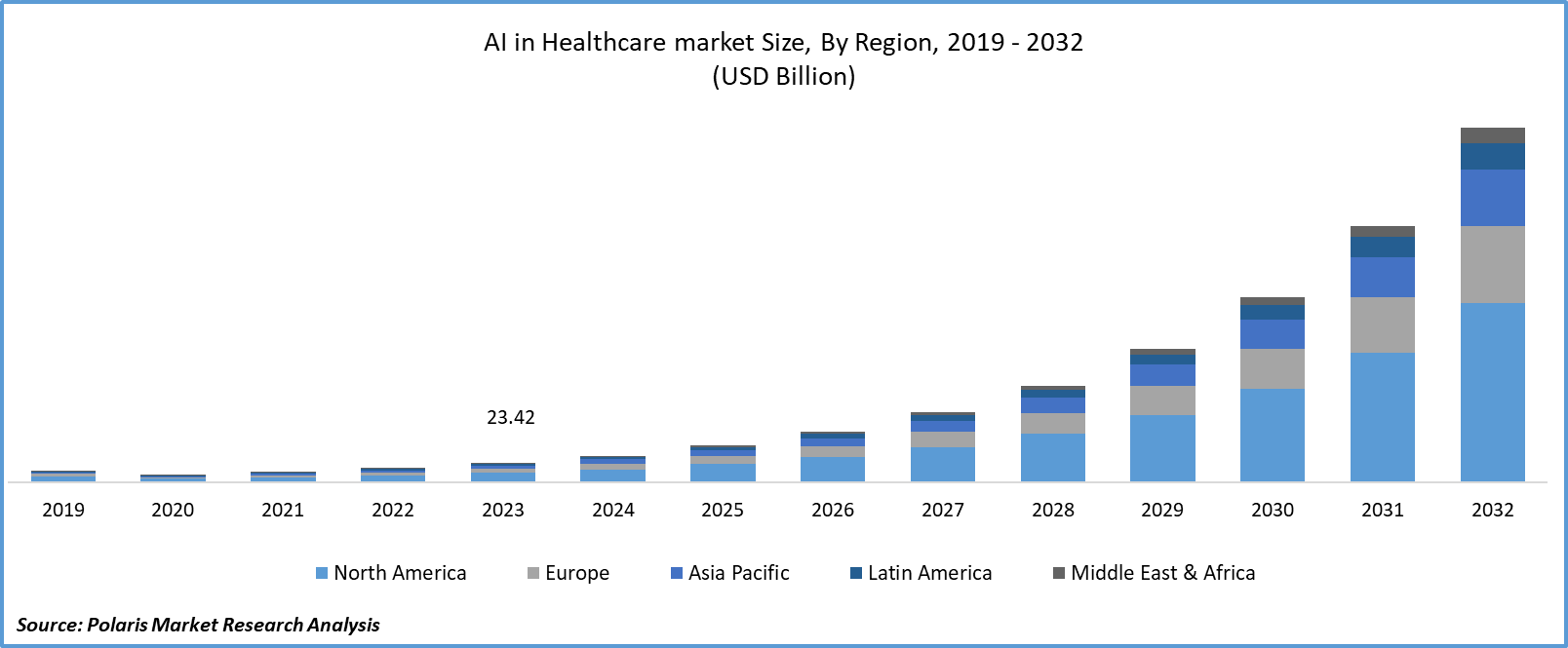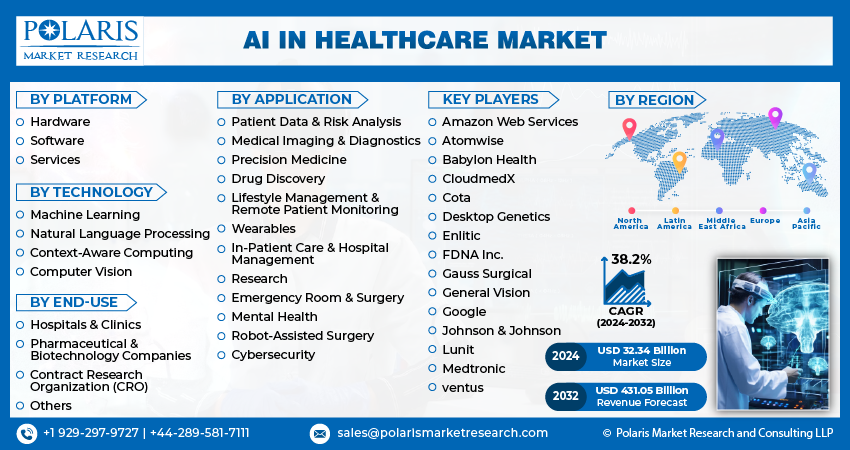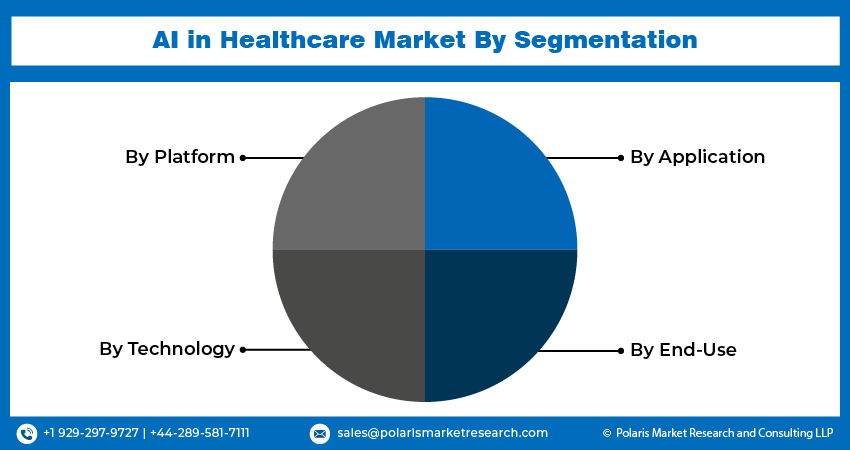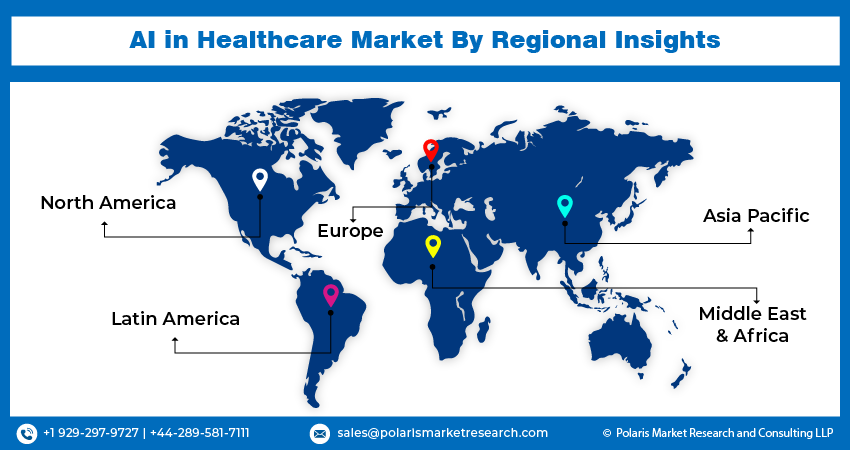
AI In Healthcare Market Share, Size, Trends, Industry Analysis Report, By Platform (Hardware, Software, Services); By Technology; By Application; By End Use; By Region; Segment Forecast, 2024- 2032
- Published Date:Feb-2024
- Pages: 116
- Format: PDF
- Report ID: PM4501
- Base Year: 2023
- Historical Data: 2019 – 2022
Report Outlook
AI in healthcare market size was valued at USD 23.42 billion in 2023. The market is anticipated to grow from USD 32.34 billion in 2024 to USD 431.05 billion by 2032, exhibiting the CAGR of 38.2% during the forecast period.
Industry Trends
AI has been extensively used in diagnostic imaging, aiding in the interpretation of medical images such as MRIs, X-rays, and CT scans. Algorithms can help in detecting tumors, abnormalities, and other medical conditions, improving the accuracy and efficiency of diagnosis. AI plays a significant role in drug discovery and development by analyzing large datasets, predicting potential drug candidates, and optimizing clinical trial processes. AI is used to analyze individual patient data, including genetic information, to tailor treatment plans based on a person's unique characteristics. Virtual assistants and chatbots powered by AI are employed to provide healthcare information, answer queries, and assist patients in managing their health. AI is used to streamline administrative tasks such as billing, scheduling, and medical coding, reducing paperwork and improving overall efficiency.
Major players in the AI in healthcare market are directing their efforts toward formulating inventive product development approaches, forging strategic partnerships, and engaging in mergers and acquisitions to broaden their market presence. This strategic focus aims to meet the increasing demand for early and accurate disease detection, address escalating healthcare costs, counteract the shortage of care providers, and deliver value-based care.
For instance, in 2020, the collaboration between Aidoc and Imbio joined forces to integrate AI technologies into medical image analysis for pulmonary embolism, enhancing detection and treatment protocols. Additionally, an expanding number of startups specializing in AI-based healthcare technologies are gaining recognition through investments from private investors and venture capitalists.

To Understand More About this Research: Request a Free Sample Report
Furthermore, the increased adoption of AI technologies in healthcare applications has prompted major market players to emphasize product innovation and technological partnerships, aiming to broaden their product offerings and address escalating demands, particularly during the pandemic. The MIT-IBM Watson AI Lab advocated for the integration of AI technologies in research endeavors exploring the health and economic impacts of the pandemic in May 2020. Similarly, Qventus introduced AI-driven patient flow automation systems, encompassing crucial resource management, optimization of hospitalization durations, COVID-19 scenario planning, and the creation of ICU capacity within its healthcare facilities.
The AI in healthcare market is currently witnessing a surge in innovation and cutting-edge technological developments, reshaping the landscape of medical services. Pioneering advancements in artificial intelligence are revolutionizing diagnostic capabilities, with machine learning algorithms enhancing the accuracy and speed of medical image interpretation. This results in increasing the AI In healthcare market share.
Key Takeaways
- North America accounted for the largest market and contributed to more than 40% of share in 2023.
- Asia Pacific is expected to witness the fastest CAGR during the forecast period.
- By application category, robot-assisted surgery segment held the largest market share in 2023.
- By end-use category, the hospitals and clinics segment is expected to grow at the fastest CAGR during the forecast period.
What are the Market Drivers Driving the Demand for AI in the Healthcare Market?
Rising Demand for Diagnostic Advancements
The AI in healthcare market is propelled by the rising demand for diagnostic advancements. This surge reflects the transformative influence of artificial intelligence across diverse dimensions of the healthcare industry. The expanding availability of extensive healthcare datasets, coupled with AI's adeptness at analyzing and extracting meaningful insights from this data, empowers healthcare professionals to make more informed and data-driven decisions. Notably, AI applications in diagnostic imaging, encompassing the interpretation of medical images like X-rays and MRIs, significantly elevate the precision and efficiency of disease detection. This, in turn, results in earlier diagnoses and more effective treatment strategies.
Moreover, AI algorithms can predict disease trends, identify at-risk populations, and facilitate proactive measures for disease prevention and management, contributing to improved population health outcomes. AI restructures administrative tasks, automates routine processes, and enhances operational efficiency, due to cost savings and resource optimization within healthcare systems.
However, AI accelerates drug discovery by analyzing vast datasets, predicting potential drug candidates, and optimizing clinical trial designs, reducing the time and costs associated with bringing new drugs to market. Ongoing advancements in AI technologies, including machine learning and natural language processing, contribute to the development of more sophisticated and accurate healthcare applications, fostering continuous growth and evolution and bringing more opportunities for market growth.

Which Factor is Restraining the Demand for AI in Healthcare Market?
Data Privacy Concerns
While Artificial Intelligence (AI) holds significant potential across various healthcare applications, its adoption remains limited due to challenges faced by healthcare providers. The complexity of integrating AI into healthcare systems poses obstacles, potentially due to inaccuracies and creating a disconnect between diagnosis and prescribed treatments.
Additionally, the AI in healthcare market faces hindrances related to data privacy issues. Many countries have stringent regulations in place to safeguard patient health data, and any violation of these regulations can result in legal and financial penalties. Concerns over patient safety and the ethical collection of sensitive data further contribute to the impediments, hindering the overall growth of AI in the healthcare market.
Report Segmentation
The market is primarily segmented based on platform, technology, application, end use, and region.
|
By Platform |
By Technology |
By Application |
By End Use |
By Region |
|
|
|
|
|
To Understand the Scope of this Report: Speak to Analyst
Category Wise Insights
By Application Insights
Based on Application analysis, the market is segmented on the basis of patient data & risk analysis, medical imaging & diagnostics, precision medicine, drug discovery, lifestyle management & remote patient monitoring, wearables, in-patient care & hospital management, research, emergency room & surgery, mental health, robot-assisted surgery, and cybersecurity. The robot-assisted surgery segment held the largest AI in healthcare market share in 2023. However, robot-assisted surgery has been a significant and growing segment within the AI in the healthcare market. Robot-assisted surgery involves the use of robotic systems to assist surgeons in performing procedures with precision and control. The technology has been gaining traction due to potential benefits such as improved accuracy, reduced invasiveness, and faster recovery times.
Robots offer precise and accurate movements, allowing surgeons to perform complex procedures with a higher degree of precision compared to traditional methods. This can result in improved surgical outcomes and reduced complications. Patients are increasingly aware of the benefits of minimally invasive and robotic-assisted procedures, leading to a growing demand for these technologies. The appeal of faster recovery times and reduced scarring contributes to patient acceptance.
By End-use Insights
Based on end-use analysis, the market has been segmented based on hospitals & clinics, pharmaceutical & biotechnology companies, contract research organizations (CROs), and others. The hospitals and clinics segment is expected to grow at the fastest CAGR during the forecast period. Hospitals and clinics are increasingly adopting AI technologies to enhance patient care, improve operational efficiency, and streamline administrative processes. AI plays a crucial role in diagnostic imaging, and its adoption in hospitals and clinics for interpreting medical images could be a significant driver for growth. AI algorithms can aid in quicker and more accurate diagnoses. Moreover, various countries worldwide are introducing several innovations and technologies towards the development of AI in the healthcare industry, which boosts the demand and needs in the utility segment.

Regional Insights
North America
North America accounted for the largest market share in 2023 and is expected to maintain its dominance over the anticipated period. North America is home to numerous major technology companies and research institutions that drive advancements in AI. This technological leadership positions the region as a key player in developing and implementing AI solutions in healthcare. Robust research and development activities in AI and healthcare innovation take place in North America. Academic institutions, private companies, and healthcare organizations collaborate to develop cutting-edge AI applications for diagnostics, treatment, and patient care. Healthcare providers in North America have been early adopters of AI applications, ranging from diagnostic imaging and personalized medicine to administrative processes. This early adoption has contributed to the region's leadership in the global AI healthcare market.
Asia Pacific
The Asia Pacific region is expected to be the fastest-growing region, with a healthy CAGR during the projected period. Many countries in the Asia Pacific region are investing in and expanding their healthcare infrastructure. This includes the development of modern hospitals and healthcare facilities that can integrate advanced technologies such as AI. There is a growing awareness and acceptance of AI in healthcare among both healthcare professionals and the general population in the Asia Pacific region. As understanding of the benefits of AI in improving patient outcomes increases, the adoption of AI in the healthcare sector.

Competitive Landscape
The AI in the healthcare market is fragmented and is anticipated to witness competition due to several players' presence. The market for artificial intelligence in healthcare is expected to grow even more as a result of major players in the industry making significant R&D investments to extend their product lines. Important market developments include the introduction of new products, larger-scale mergers and acquisitions, contractual agreements, and cooperation with other companies. Market participants participate in these events to strengthen their positions.
Some of the major players operating in the global market include:
- Amazon Web Services
- Atomwise
- Babylon Health
- CloudmedX
- Cota
- Desktop Genetics
- Enlitic
- FDNA Inc.
- Gauss Surgical
- General Vision
- Johnson & Johnson
- Lunit
- Medtronic
- ventus
Recent Developments
- In November 2023, Wipro and NVIDIA collaborated to accelerate the use of AI in healthcare organizations. With the aid of AI, the partnership is anticipated to improve Medicare, Medicaid, and other platforms.
- In October 2023, ZS launched the ZAIDYN linked Health solution, which will use AI to help biopharmaceutical companies, payers, and healthcare providers contact patients, obtain health data, and conduct linked research.
Report Coverage
The AI in healthcare market report emphasizes key regions across the globe to provide a better understanding of the product to the users. Also, the report provides market insights into recent developments, and trends and analyzes the technologies that are gaining traction around the globe. Furthermore, the report covers an in-depth qualitative analysis about various paradigm shifts associated with the transformation of these technology
The report provides detailed analysis of the market while focusing on various key aspects such as competitive analysis, platform, technology, application, end-use, and their futuristic growth opportunities.
AI in Healthcare Market Report Scope
|
Report Attributes |
Details |
|
Market size value in 2024 |
USD 32.34 billion |
|
Revenue forecast in 2032 |
USD 431.05 billion |
|
CAGR |
38.2% from 2024 – 2032 |
|
Base year |
2023 |
|
Historical data |
2019 – 2022 |
|
Forecast period |
2024 – 2032 |
|
Quantitative units |
Revenue in USD billion and CAGR from 2024 to 2032 |
|
Segments covered |
By Platform, By Technology; By Application, By End Use, By Region |
|
Regional scope |
North America, Europe, Asia Pacific, Latin America, Middle East & Africa |
|
Customization |
Report customization as per your requirements with respect to countries, region, and segmentation. |
FAQ's
The AI in healthcare market size is expected to reach USD 431.05 billion by 2032
Key players in the market are Amazon Web Services, Atomwise, Babylon Health, CloudmedX, Cota, Desktop Genetics, Enlitic
North America contribute notably towards the global AI In Healthcare Market
AI in healthcare market exhibiting the CAGR of 38.2% during the forecast period.
The AI In Healthcare Market report covering key segments are platform, technology, application, end-use, and region.
